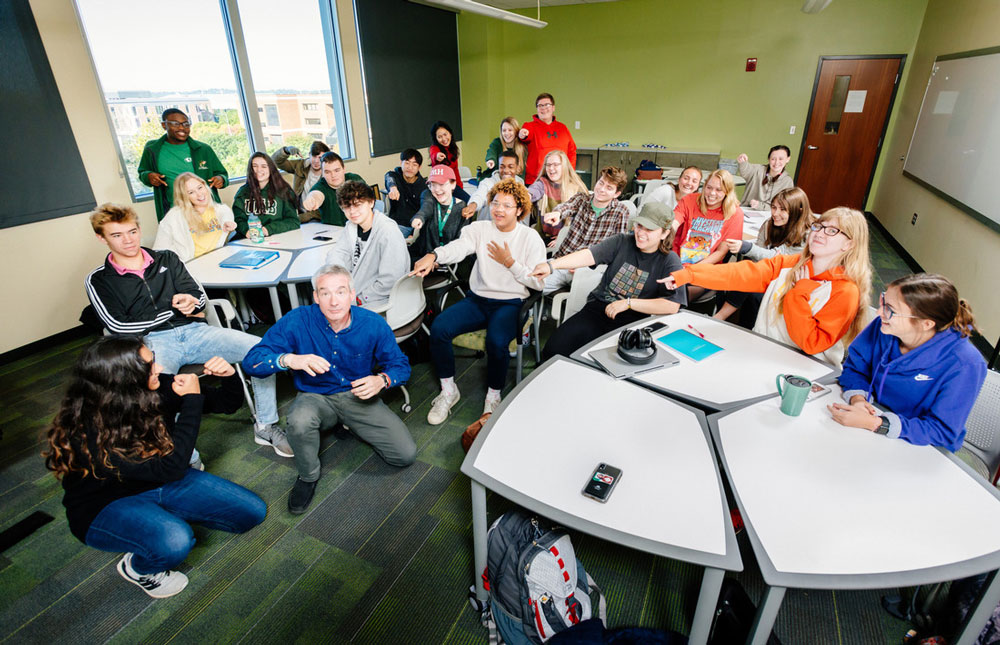Eight a.m. classes are no joke. Especially if you’re a first-semester freshman, just getting used to living on your own for the first time.
Once you make it to the fifth floor of Heritage Hall, though, everything changes. The lectures are one gag after another. Your fellow students are cutting up. And your professor is giving as good as he gets.
“Where were you?” Kevin Fontaine, Ph.D., chair of the Department of Health Behavior in the School of Public Health, asks a late-arriving student. “I get concerned when my students don’t show up. It’s obviously not because of me.”
 Kevin Fontaine and students in the Comedy, Health and Well-Being class in fall 2019.
Kevin Fontaine and students in the Comedy, Health and Well-Being class in fall 2019.
Best. Class. Ever.
That may be a joke, but it’s not wrong. Three Honors College sophomores who took Fontaine’s Comedy, Health and Well-Being course in its inaugural “season” in fall 2018 reach the unanimous conclusion that it was the best class of their freshman years.
“It was one of the only classes I looked forward to every time,” said Emily Beach, a sophomore nursing student from from Tuscaloosa. “Beginning the morning with a laugh was good, and Kevin was really funny.”
Honors course proposals due by Nov. 20Innovative, creative faculty in any discipline can teach courses within the Honors College. Find submission guidelines and contact information online. |
“It was the first 8 a.m. class I had ever woken up and was excited to go to,” said Evan Parker, a sophomore from Muscle Shoals who plans to go into pharmacy.
“It was the one class I wanted to go to every week,” agreed Datreauna Dye, a nursing major from Oxford minoring in psychology. Fontaine “is very blunt,” she said. “We had one class where we had to roast him. That was fun.”
It’s a hit!
“If I’m not enjoying the class, I know the students are not,” Fontaine said. “I like to think my role is to create an enduring experience.”
Fontaine has been teaching Honors College classes since 2015. The college requires that new students take one of more than a dozen seminars offered each fall in lieu of the First Year Experience course that is mandatory for other UAB freshmen. (In addition to Fontaine’s course, other seminars offered this year include Investigations into Economic Class in America, Leadership for Social Change, Think Like an Entrepreneur, Ethical Issues in Women’s Health and How to Read a Film.)
Fontaine taught classes on healing and herbal medicine before launching Comedy, Health and Well-Being last year. “I had originally intended to create a new and different course each year, but I found that the comedy class was such a hit, and so much fun to teach, that I ran it again this year,” Fontaine said.
The goal was “to construct a class for first-semester freshmen that was low-pressure, to provide an escape valve,” Fontaine said. “The students are undergoing so many transitions and adjustments. These days anxiety/depression and suicidal ideation are rampant among college students. My goal was to give them an outlet to talk and share and to use laughter to help cope. Finding the humor in life is a great way to deal with the stresses we all face and likely provides many mental and physical health benefits. I do not envy young people, especially in this age of social media where everything and everyone is under the microscope. It troubles me greatly that they are under such pressure to make an impression, to fit in, to be accepted. I told my current class, ‘Don’t worry about having to make an impression — don’t drink the Kool Aid.’” He also talks to the students about developing their own happiness plan.
Parker describes Fontaine as “hilarious in his own special way,” but he took away more from the class than jokes. “The special part about the Honors College is that the teachers really care about how you are doing,” Parker said. “He would give us tips on how to live as a successful college student, for example.”
“Comedy is a great stress-reliever,” Dye agreed. “It takes you away from school and the problems of life.”
A laugh a minute
One recent Tuesday, Fontaine treated the class to routines by Rodney Dangerfield, George Carlin, Jerry Seinfeld, Robert Klein and modern favorites Key & Peele. Fontaine told the students to note how the rapid-fire one-liners of stand-ups such as Dangerfield segued into the observational, storytelling humor of Seinfeld, Carlin and Klein. (The Key & Peele routine, thrown in as lagniappe, was the sketch “An insult comic meets his match.”)
| One of the activities called for in the Education pillar of Forging the Future, UAB's strategic plan, is to "promote innovative instructional practices...." Kevin Fontaine's seminar exemplifies that goal. |
Seinfeld and Key & Peele they know, but Fontaine’s students aren’t familiar with Dangerfield or Carlin. During the class, one of them does some quick online research on Carlin and reports that he was the narrator on Thomas the Tank Engine, to general amusement.
During the course, students must write papers analyzing a comedy routine. Robin Williams is a popular choice. But “last year, and I’m sure this year, about 80% of the students choose a comedian I’ve never heard of — which is good because I get to learn about more practitioners,” Fontaine said. (His personal favorites: Don Rickles, Bill Burr, Rodney Dangerfield, Richard Pryor, George Carlin, Larry David.)
Humor helps it stick
The final assignment presents students with a choice. They can work “in a group of three to five people to develop and present a humorous public health campaign,” Fontaine said. The idea is that humor “may help the message stick,” he explained. Or they can “develop and deliver a three- to five-minute stand-up routine on any topic or theme they wish.” This past year, only one student chose the stand-up option. This year, four students have said they will give it a try.
Topics for the public-health campaign were drawn at random, but they were all sensitive. Beach and her group made a video about STDs. Dye’s group got teen pregnancy. Parker’s group drew obesity as a topic. Their skit involved Kentucky Fried Chicken pitchman Colonel Sanders visiting the doctor’s office with a long list of medical complaints. “After our jokes we gave out tips and information on how to eat better and what foods to avoid,” Parker said.
One of Parker’s favorite discoveries in the class was the surrealist 1990s comic Mitch Hedberg. “I had never heard of him,” he said. “He was just one-liners — the way he was able to sound off on all these jokes and keep them in his head was impressive.”
Fontaine explained how comedy like this looks effortless but is built on endless practice, Parker said. “He told us, ‘the key to making something funny is all about delivery.’”
Fontaine demonstrates at the end of the class period. “All right,” he announces, getting his students’ attention. They have been distracted by the presents Fontaine just passed out — gag gifts from a local discount store that they are trading and showing off with glee. They look up. Fontaine waits a beat before continuing with mock exasperation: “Get out of here.”
Everyone laughs. Then it’s back to the real world.

Faculty fellows to foster community, academic enrichment for honors
